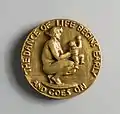Alexander Stirling Calder
Alexander Stirling Calder (January 11, 1870 – January 7, 1945) was an American sculptor and teacher. He was the son of sculptor Alexander Milne Calder and the father of sculptor Alexander (Sandy) Calder. His best-known works are George Washington as President on the Washington Square Arch in New York City, the Swann Memorial Fountain in Philadelphia, and the Leif Eriksson Memorial in Reykjavík, Iceland.
Alexander Stirling Calder | |
|---|---|
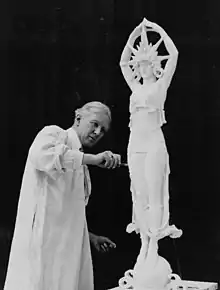 A. Stirling Calder at work on the Star Maiden (1913). Audrey Munson was the model. | |
| Born | January 11, 1870 Philadelphia, Pennsylvania |
| Died | January 7, 1945 (aged 74) Manhattan, New York City |
| Nationality | American |
| Education | Pennsylvania Academy of Fine Arts Académie Julian |
| Known for | Sculpture |
Notable work | Washington as President Swann Memorial Fountain Leif Eriksson Memorial |
Education
A. Stirling Calder was born in Philadelphia, Pennsylvania, the son of sculptor Alexander Milne Calder and Margaret Stirling. He attended city public schools, and enrolled at the Pennsylvania Academy of Fine Arts in Fall 1885, at age 15. He studied under Thomas Eakins for several months, until the teacher's forced resignation in February 1886. Calder remained at PAFA, studying under Thomas Anshutz and James P. Kelly. Two of his sculptures were accepted for PAFA's 1887 annual exhibition, a rare honor for a student.[1]:170
His father designed and was then in the midst of executing, the extensive sculpture program for Philadelphia City Hall. Calder worked as an apprentice on the project during the summers, and is reported to have modeled an arm for one of the figures. He made his first trip to Europe in Summer 1889, and returned there to study the following year.[1]:170
Calder moved to Paris in Fall 1890, where he studied at the Académie Julian under Henri Michel Chapu. The following year, he was accepted at the École des Beaux-Arts, where he entered the atelier of Alexandre Falguière.[1]:170
Career
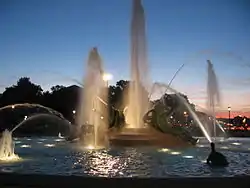
In 1892, he returned to Philadelphia and began his career as a sculptor in earnest. His first major commission, won in a national competition, was for a larger-than-life-size statue of Dr. Samuel Gross (1895–97) for the National Mall in Washington, D.C. Calder replicated the pose of Dr. Gross from Eakins's 1875 painting The Gross Clinic. Another early commission was for a set of twelve larger-than-life-size statues of Presbyterian clergymen for the facade of the Witherspoon Building (1898–99) in Philadelphia.[1]:170
In 1906, he was elected into the National Academy of Design as an Associate member, and became a full member in 1913.
In Pasadena, he modeled architectural sculpture for the Throop Polytechnic Institute (now the California Institute of Technology). He returned to the east coast in 1910.[1]:171
In 1912, he was named acting-chief (under Karl Bitter) of the sculpture program for the Panama-Pacific Exposition, a World's Fair to open in San Francisco, California, in February 1915. He obtained a studio in NYC and there employed the services of model Audrey Munson who posed for him – Star Maiden (1913–1915) – and a host of other artists. For the exposition, Calder completed three massive sculpture groups, The Nations of the East and The Nations of the West, which crowned triumphal arches, and a fountain group, The Fountain of Energy. Following Bitter's sudden death in April 1915, Calder completed the Depew Memorial Fountain (1915–1919) in Indianapolis, Indiana.
.jpg.webp)
Hermon Atkins MacNeil and Calder were commissioned to create larger-than-life-size sculptures for the Washington Square Arch in New York City. George Washington as Commander-in-Chief, Accompanied by Fame and Valor (1914–1916) was sculpted by MacNeil; and George Washington as President, Accompanied by Wisdom and Justice (1917–18) by Calder. These are sometimes referred to as Washington at War and Washington at Peace.[2]
He sculpted a number of ornamental works for "Vizcaya", the James Deering estate outside Miami, Florida. These included the famous Italian Barge (1917–1919), a stone folly in the shape of a boat, projecting into Biscayne Bay.
Two of his major commissions of the 1920s were the Swann Memorial Fountain (1920–1924) in Logan Circle, and the architectural sculpture program for the University of Pennsylvania Museum of Archaeology and Anthropology (completed 1931), both in Philadelphia.
He was one of a dozen sculptors invited to compete in Oklahoma's Pioneer Woman statue competition in 1926–27,[3] which was won by Bryant Baker. In 1927, he was also commissioned by the Berkshire Museum to sculpt the woodwork and fountain of the Museum's Ellen Crane Memorial Room in Pittsfield, Massachusetts.
In 1929, he won the national competition for a monumental statue of Leif Eriksson, to be the gift of the United States to Iceland in commemoration of the 1000th anniversary of the Icelandic Parliament. Standing before the Hallgrímskirkja, the Lutheran cathedral in Reykjavík, and facing west toward the Atlantic Ocean and Greenland, the Leif Eriksson Memorial (1929–1932) has become as iconic for Icelanders as the Statue of Liberty is for Americans.
Teacher
Throughout his career, Calder frequently worked as a teacher. He was instructor in modeling at the Pennsylvania Museum School of Industrial Art from 1899 to 1904.[4] He taught at the National Academy of Design's evening school, 1910–11, and alongside Hermon Atkins MacNeil at NAD, 1911–12. He taught modeling at the Art Students League of New York, 1918–22.[1]:171 He was never on PAFA's faculty, but may have occasionally lectured there, where his friend Charles Grafly was instructor in sculpture.[1]:171, n. 4
Personal
Calder married portrait painter Nanette Lederer on February 22, 1895, and they lived in Philadelphia for the first decade of their marriage. They had two children: Margaret Calder Hayes (1896–1988) and Alexander "Sandy" Calder III (1899–1976).[1]:171 Calder contracted tuberculosis in 1905, and he and his wife moved to Arizona for a year, leaving the children with friends (to protect them from the disease). Once he recovered his health, the family was reunited in 1906, and settled in Pasadena, California.[5] They moved back east in 1910, and settled in Croton-on-Hudson, New York.[1]:171
Calder died of funnel chest syndrome in 1945, a disease he developed while working on his final sculpture, Sicilian Nectar. He is buried in West Laurel Hill Cemetery in Bala Cynwyd, Pennsylvania. His memoir, Thoughts of A. Stirling Calder on Art and Life (1947), was published posthumously.
Selected works
| Title | Image | Year | Location/GPS Coordinates | Material | Height | Notes |
|---|---|---|---|---|---|---|
| Dr. Samuel D. Gross Memorial[6] | 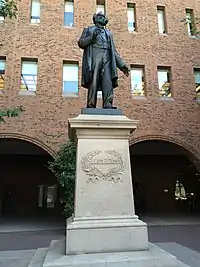 |
1895–1897 | Thomas Jefferson University, Philadelphia, Pennsylvania 39.94794167°N 75.15820278°W |
bronze | 111 in (280 cm) | .jpg.webp) From 1897 to 1970, the statue stood on the National Mall in Washington, D.C.: |
| Bust of Major General John F. Hartranft[7] | 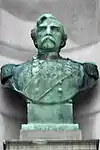 |
1898 | Smith Memorial Arch, West Fairmount Park, Philadelphia, Pennsylvania 39.9775°N 75.206667°W |
bronze | 36 in (91 cm) | Gen. Hartranft was a U.S. Medal of Honor recipient for the First Battle of Bull Run. |
| Class of 1892 Drinking Fountain[8] (The Scholar and the Football Player) |
1900 | Quadrangle Dormitories, University of Pennsylvania, Philadelphia, Pennsylvania 39.950806°N 75.197306°W, |
bronze | 21 in (53 cm) | _(14578112798).jpg.webp) | |
| Overmantel frieze: The Boar Hunt | .jpg.webp) |
c.1900 | Keil Hall, Mercersburg Academy, Mercersburg, Pennsylvania 39.8270°N 77.8991°W |
carved oak | Modeled by Calder, carved by John J. Maene.[9] | |
| Sewell Cross[10] Major General William Joyce Sewell Monument |
 |
1901 | Harleigh Cemetery, Camden, New Jersey 39.923889°N 75.089722°W |
green granite | 20 ft (6.1 m) | Modeled by Calder, carved by Leland & Hall Company. Gen. Sewell was a U.S. Medal of Honor recipient for the Battle of Chancellorsville. Calder was awarded PAFA's 1905 Walter Lippincott Prize for the Sewell Cross.[1]:171 |
| Man Cub: "Sandy" Calder at Age 3 | 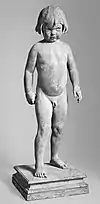 |
1901–02 | Pennsylvania Academy of the Fine Arts, Philadelphia, Pennsylvania |
plaster (original lost) |
45 in (110 cm) | PAFA purchased Calder's plaster original in 1905, and used it to make a 1906 bronze cast.[11] The plaster was either returned to Calder or lost (by 1941).[1]:172 A 1922 bronze cast is at the Metropolitan Museum of Art.[12] |
| Sundial[13] | 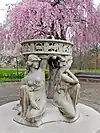 |
1903-1905 | Fairmount Park Horticultural Center, West Fairmount Park, Philadelphia, Pennsylvania 39.983150°N 75.212600°W |
marble | 56.5 in (144 cm) | Located in the Sunken Gardens: |
| Missouri: The Queen of Rivers[14] | _(14598348608).jpg.webp) |
1904 | Louisiana Purchase Exposition, St. Louis, Missouri |
plaster | Calder won a silver medal for his sculpture at the 1904 World's Fair.[1]:170 | |
| Philippe Francois Renault[15] |  |
plaster | ||||
| Calder Cross[16] William Hickman Harte Memorial Cross |
 |
c.1905 | Chippiannock Cemetery, Rock Island, Illinois 41.481667°N 90.577778°W |
granite | 102 in (260 cm) | Master William Hickman Harte was a Union naval officer who died in the June 17, 1862 Battle of Saint Charles, following the sinking of the USS Mound City. Fifty years later, Harte's son located his Arkansas grave, and commissioned this cenotaph for their home town cemetery.[17] |
| Henry Charles Lea Monument[18] |  |
1911 | Laurel Hill Cemetery, Philadelphia, Pennsylvania 40.0042°N 75.1902°W |
bronze | 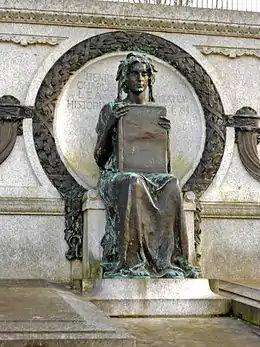 The seated figure is Clio, the Muse of History: | |
| Stretching Girl[19] | c.1911 | National Academy of Design, Manhattan, New York City |
bronze | 36 in (91 cm) | Calder's NAD diploma piece, presented following his election as an Academician in 1913.[20] Robert Henri painted Calder's NAD diploma portrait.[20] Another bronze cast is at the Crystal Bridges Museum of American Art in Bentonville, Arkansas.[21] | |
| An American Stoic: Portrait of Najinyankte[22][23] | 1912 | Rhode Island School of Design Museum, Providence, Rhode Island |
bronze | 28 in (71 cm) | A standing Sioux man wrapped in a blanket. | |
| Star Maiden[24] | 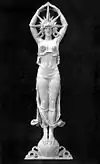 |
1913–1915 | Oakland Museum, Oakland, California |
bronze | 51 in (130 cm) | .jpg.webp) |
| Fountain of Energy (destroyed) |   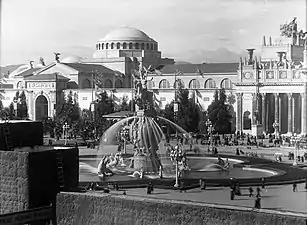  |
1913–1915 | Panama-Pacific International Exposition, San Francisco, California |
staff | 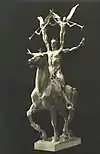 outstretched arms have severed the lands and let the waters pass. Upon his mighty shoulders stand Fame and Glory, heralding the coming of a conquerer. Energy, the Power of the Future, the Superman, approaches."[25] | |
 The Eastern Hemisphere, and a large reclining male figure with the head of a bull, The Western Hemisphere: | ||||||
| 4 sculpture groups were clustered around the globe: The Atlantic Ocean, The Pacific Ocean, The North Sea, The South Sea     | ||||||
12 Nerieds riding dolphins were spaced around the pool's perimeter:  | ||||||
| The Nations of the East[26] (destroyed) |  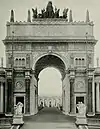 |
1913–1915 | atop The Arch of the Rising Sun, Panama-Pacific International Exposition, San Francisco, California |
staff | ||
| The Nations of the West[27] (destroyed) |   |
1913–1915 | atop The Arch of the Setting Sun, Panama-Pacific International Exposition, San Francisco, California |
staff |  | |
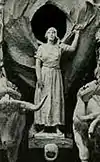 | ||||||
| Depew Memorial Fountain | 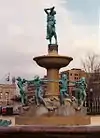 |
1915–1917 | University Park, Indianapolis, Indiana 39.771944°N 86.156944°W |
bronze | Crowning figure: 90 in (230 cm) |
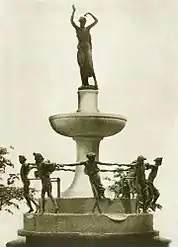 Bitter's 1915 maquette for the fountain: |
| George Washington as President, Accompanied by Wisdom and Justice[2] |
 |
1917–18 | Washington Square Arch, Washington Square, Manhattan, New York City 40.73099°N 73.99805°W |
marble | 12 ft (3.7 m) | .jpg.webp) Hermon Atkins MacNeil modeled Washington at War (1914–16). The pair flank the north side of the arch. |
| The Great Stone Barge[28][29] (Delights and Terrors of the Sea) |
 |
1917–1919 | "Villa Vizcaya" (James Deering estate), Coconut Grove, Florida 25.743753°N 80.210232°W |
limestone |  The eroded sculptures were used to cast concrete replicas in 1981.[31] | |
| Garden sculpture |  |
.jpg.webp)     | ||||
| The Little Dear with the Tiny Black Swan (Leda and the Swan)[32] |
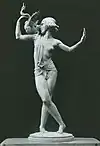 |
1918-1921 | Denver Art Museum, Denver, Colorado |
bronze | 28 in (71 cm) | A 60.25 in (153.0 cm) version is a promised gift to Crystal Bridges Museum of American Art.[33] |
| Swann Memorial Fountain[34] (Fountain of Three Rivers) |
 |
1920–1924 | Logan Circle, Philadelphia, Pennsylvania 39.95795°N 75.170819°W |
bronze | Central figures: 11 ft (3.4 m) |
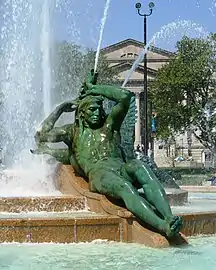 The female allegorical figures represent the Schuylkill River and the Wissahickon Creek. The male Lenni Lenape figure represents the Delaware River. |
| Naiad with Tragic Mask[35] Model for a Fountain |
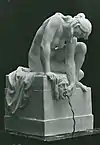 |
c.1920 | Pennsylvania Academy of the Fine Arts, Philadelphia, Pennsylvania |
painted plaster | 16.25 in (41.3 cm) | A bronze cast is at the Reading Public Museum in Reading, Pennsylvania.[36] A larger plaster version is at the Montclair Art Museum in Montclair, New Jersey.[37] |
| Scratching Her Heel[38] | 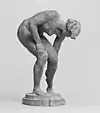 |
1921 | Metropolitan Museum of Art, Manhattan, New York City |
bronze | 12 in (30 cm) | Another bronze cast is at the Telfair Museum of Art in Savannah, Georgia.[39] |
| The Last Dryad[40] |  |
1921 | Philadelphia Museum of Art, Philadelphia, Pennsylvania |
plaster | 70.5 in (179 cm) |  |
| Shakespeare Memorial[41] (Tragedy and Comedy, Hamlet and the Fool) |
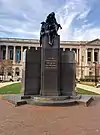 |
1923-1926 | In front of the Free Library of Philadelphia, Logan Square, Philadelphia, Pennsylvania 39.9595°N 75.171°W |
bronze | 91.5 in (232 cm) | 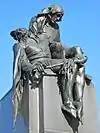 Touchstone and Prince Hamlet: Another bronze cast is at Brookgreen Gardens.[42] |
| Head of George Bellows[43] | 1925 | Conner-Rosenkranz Gallery, Manhattan, New York City |
plaster | 14.5 in (37 cm) | A bronze cast is at the New York Historical Society.[44] | |
| Our Lady and the Holy Child[45] (A Study in French Gothic Style) |
 |
1926 | St. Mary's of Redford Church, Detroit, Michigan |
marble | 7 ft (2.1 m) | Located in a niche behind the High Altar.[46] |
| Pioneer Woman (Self-Reliant)[47] | 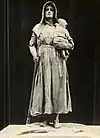 |
1926–27 | Woolaroc Museum, Bartlesville, Oklahoma 36.642339°N 96.095964°W |
bronze | 40 in (100 cm) | One of twelve bronze models created by American sculptors for the 1927 Pioneer Woman statue competition. Bryant Baker won the commission. His heroic-sized Pioneer Woman was dedicated in 1930, in Ponca City, Oklahoma. Calder received a $10,000 honorarium for his model.[48] |
| Bust of John James Audubon[49] | 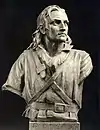 |
1927 | Hall of Fame for Great Americans, Bronx Community College, Bronx, New York City 40.858611°N 73.914444°W |
bronze | ||
| Leif Eriksson Memorial[50] | 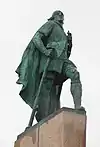 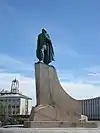 |
1929–1932 | Hallgrímskirkja Cathedral, Reykjavík, Iceland |
bronze | 139 in (3.5 m) |  founding of the Althing, Iceland's parliament. The statue appeared on a U.S. postage stamp and an Icelandic coin. Calder's plaster model is at the Smithsonian American Art Museum.[51]  View from the cathedral's tower, looking west to the Atlantic Ocean: |
| Cruel Nature: Self-Portrait at Age 60[53][54] | 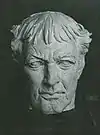 |
c.1930 | National Portrait Gallery, Washington, D.C. |
terra cotta | 12.5 in (32 cm) | |
| Robert Henri: The Painter-Teacher with the Gift of Friendship[55][56] (Posthumous Bust of Robert Henri) |
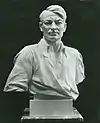 |
1934 | Pennsylvania Academy of the Fine Arts, Philadelphia, Pennsylvania |
plaster (unlocated)[57] |
32 in (81 cm) | Calder and Henri (1865–1929) had been friends since 1885, when both were first-year students at PAFA.[1]:174 Calder's widow had a bronze cast made of the bust in 1947, which she donated to PAFA.[1]:174 |
| Posthumous Bust of John Singer Sargent[58] | 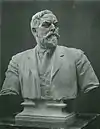 |
c.1934 | Bronx Community College, Bronx, New York City |
plaster | ||
| Introspection |  |
c.1935 | plaster | |||
| Continental Post Rider[59] |  |
1936 | William Jefferson Clinton Federal Building, Washington, D.C. |
aluminum | 51.5 in (131 cm) | |
| Bust of William Penn[60] | 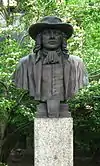 |
1936 | Hall of Fame for Great Americans, Bronx Community College, Bronx, New York City 40.858611°N 73.914444°W |
bronze | ||
| Nature's Dance[61][62] (The Dance of Life) |
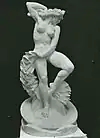 |
1938 | Brookgreen Gardens, Murrells Inlet, South Carolina 33.520556°N 79.099722°W |
Indiana limestone | 80 in (200 cm) | |
| Bishop William White[63][64] |  |
1940 | Washington Memorial Chapel, Valley Forge, Pennsylvania 40.104528°N 75.437944°W |
bronze | The Right Reverend White was the first bishop of the American Episcopal Church. Calder's last major commission. | |
| Bust of Winston Churchill[65] | 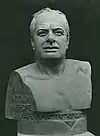 |
1943 | plaster | Inscription: "HAVE FAITH, HAVE HOPE, DELIVERANCE IS SURE." JULY 14, 1941. |
Architectural sculpture
- Twelve cast stone figures of Presbyterian clergymen, Witherspoon Building, Philadelphia, Pennsylvania, 1898–99, Joseph Miller Huston, architect.
- Six of the figures were removed in 1961, and relocated to the garden of the Presbyterian Historical Society.[66]
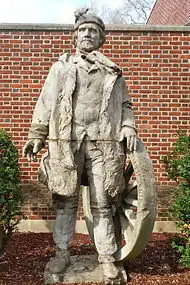 Reverend Marcus Whitman
Reverend Marcus Whitman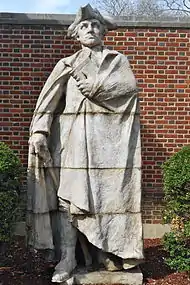 Reverend James Caldwell
Reverend James Caldwell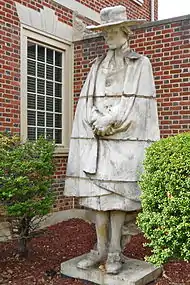 Reverend Samuel Davies
Reverend Samuel Davies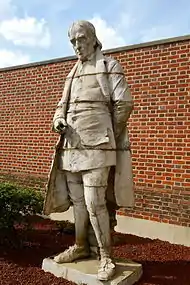 Reverend John McMillan
Reverend John McMillan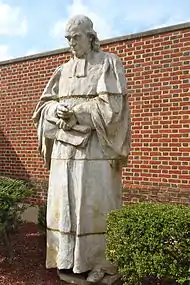 Reverend John Witherspoon
Reverend John Witherspoon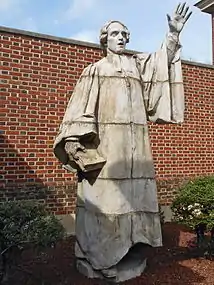 Reverend Francis Makemie
Reverend Francis Makemie
- Six spandrel figures, cast concrete, Throop Polytechnic Institute (now California Institute of Technology), Pasadena, California, 1906–1909, Myron Hart & Elmer Grey, architects.[67]
- Nature and Art, Energy and Law, Science and Imagination[68]
- Oakland Civic Auditorium, Oakland, California, 1914, John J. Donovan, architect.[69]
- Missouri State Capitol, Jefferson City, Missouri, 1924, Tracy and Swartwout, architects.
- South Frieze, limestone, 6 ft (1.8 m) x 138 ft (42 m), depicts Missouri history in 13 bas relief panels.[70] The frieze flanks the tops of the central portico's columns and continues behind them.
- North Frieze, limestone, bas relief panels depict Native Americans and Europeans.[71] The frieze flanks the tops of the central columns and continues inside the curved portico.
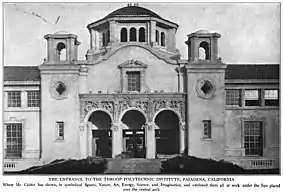 Throop Polytechnic Institute, c.1910.
Throop Polytechnic Institute, c.1910..jpg.webp) Oakland Civic Auditorium, c.1917
Oakland Civic Auditorium, c.1917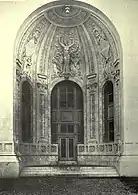 Half-domed frieze
Half-domed frieze.jpg.webp) Missouri State Capitol, south façade.
Missouri State Capitol, south façade. Missouri State Capitol, north facade.
Missouri State Capitol, north facade.
- Four figures of famous actresses, marble, I. Miller Building, Broadway and West 46th Street, Manhattan, New York City, 1927–1929:
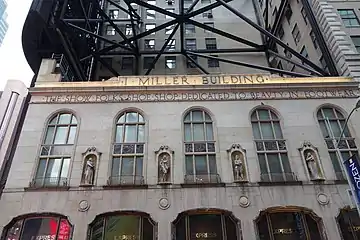 I. Miller Building facade
I. Miller Building facade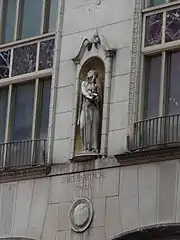 Ethel Barrymore as Ophelia[72]
Ethel Barrymore as Ophelia[72]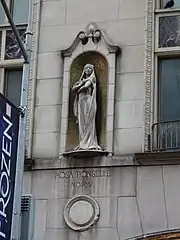
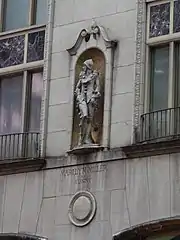
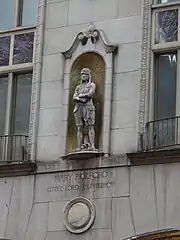
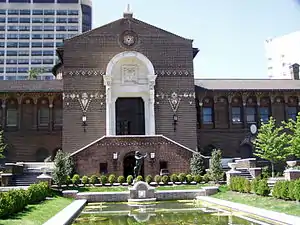
- Sculpture program for University of Pennsylvania Museum of Archaeology and Anthropology, Philadelphia, Pennsylvania, completed 1931, Wilson Eyre, Frank Miles Day, and Cope & Stewardson, architects:
References
- Armstrong, Craven et al., 200 Years of American Sculpture, Whitney Museum of Art, NYC, 1976
- Bach, Penny Balkin, Public Art in Philadelphia, Temple University Press, Philadelphia, Pennsylvania, 1992
- Calder, A. Sterling, Thoughts of A. Stirling Calder on Art and Life, Privately published, New York, 1947
- Craven, Wayne, Sculpture in America, Thomas Y Crowell Co, New York 1968
- Fairmount Park Art Association, Sculpture of a City: Philadelphia's Treasures in Bronze and Stone, Walker Publishing Co., Inc, New York. NY 1974
- Falk, Peter Hastings, ed., Who was Who in American Art, Sound View Press, Madison Connecticut, 1985
- Gadzinski, Cunningham, Panhorst et al., American Sculpture in the Museum of American Art of the Pennsylvania Academy of the Fine Arts, Museum of American Art of the Pennsylvania Academy of the Fine Arts, Philadelphia, Pennsylvania 1997
- Hayes, Margaret Calder, Three Alexander Calders, Paul S Eriksson Publisher, Middlebury, Vermont, 1977
- Hoeber, Arthur (September 1910). "Calder – A "Various" Sculptor: A Man Of Craftmanship And Brains". The World's Work: A History of Our Time. XX: 13377–13388. Retrieved 2009-07-10.
- Kvaran and Lockley, A Guide to American Architectural Sculpture unpublished manuscript,
- Opitz, Glenn B ed., Mantle Fielding's Dictionary of American Painters, Sculptors & Engravers, Apollo Book, Poughkeepsie NY, 1986
- Proske, Beatrice Gilman, Brookgreen Gardens Sculpture, Brookgreen Gardens, South Carolina, 1968
Notes
- Gadzinski, Cunningham, Panhorst et al.
- Washington Arch: George Washington as President, from SIRIS.
- ‘’Exhibition of Models for a Monument to the Pioneer Woman’’ at the Chicago Architectural Exhibition, East Galleries, Art Institute of Chicago, June 25 to August 1, 1927
- John William Leonard, ed., Men and Things: A Biographical Dictionary of Contemporaries (New York: L. R. Hamersly & Company, 1908), p. 374.
- Alexander Calder, An Autobiography with Pictures (Pantheon Books, 1966).
- Dr. Samuel Gross, from SIRIS.
- Major General John Frederick Hartranft, from SIRIS.
- A Drinking Fountain, from SIRIS.
- Anna Margaretta Archambault, A Guide Book of Art, Architecture, and Historic Interest in Pennsylvania (Philadelphia: John C. Winston Company, 1924), p. 250.
- The Sewell Cross, from SIRIS.
- Man Cub, from SIRIS.
- "Alexander Stirling Calder | Man Cub | The Metropolitan Museum of Art". Metmuseum.org. Retrieved 2014-08-10.
- Sundial, from SIRIS.
- The Missouri, from SIRIS.
- Philippe Francois Renault, from SIRIS.
- Calder Cross, from SIRIS.
- Minda Powers-Douglas, Chippiannock Cemetery (Arcadia Publishing, 2010), p. 98.
- Henry Charles Lea Monument, from SIRIS.
- Stretching Girl, from SIRIS.
- David B. Dearinger, Paintings & Sculpture at the National Academy of Design, Volume 1: 1826–1925 (Hudson Hills Press, 2004), p. 84.
- Stretching Girl, from Crystal Bridges Museum of American Art.
- Najinyankte, from SIRIS.
- An American Stoic, from Bonham's Auction House.
- Star Maiden, from SIRIS.
- Stella G. S. Perry, The Sculpture and Mural Decorations of the Exposition: A Photo Survey of the Art of the Panama-Pacific International Exposition (San Francisco: Paul Elder and Company, Publishers, 1921), p. 16.
- The Nations of the East, from SIRIS.
- The Nations of the West, from SIRIS.
- Stone Barge, from SIRIS.
- Woodward, Kellie (2009-10-15). "Vizcaya Museum Shop: The Stone Barge, Alexander Stirling Calder, and the Internet". Vizcayamuseumshop.blogspot.com. Retrieved 2014-08-10.
- Jed Perl, Calder: The Conquest of Time — The Early Years: 1898–1940 (Knopf Doubleday Publishing Group, 2017), p. 14.
- Delights and Terrors of the Sea, from SIRIS.
- Leda and the Swan, from SIRIS.
- The Little Dear with the Tiny Black Swan, from Crystal Bridges Museum of American Art.
- Swann Memorial Fountain, from SIRIS.
- Naiad with Tragic Mask, from PAFA.
- Naiad with Mask, from Reading Public Museum.
- Naiad with a Mask, from SIRIS.
- "Alexander Stirling Calder | Scratching Her Heel | The Metropolitan Museum of Art". Metmuseum.org. Retrieved 2014-08-10.
- Scratching Her Heel, from SIRIS.
- "Philadelphia Museum of Art – Collections Object : The Last Dryad". Philamuseum.org. 2007-02-17. Retrieved 2014-08-10.
- Shakespeare Memorial, from SIRIS.
- Tragedy and Comedy, from SIRIS.
- George Bellows, from SIRIS.
- George Wesley Bellows, from SIRIS.
- Our Lady and the Holy Child, from SIRIS.
- Our Lady and the Holy Child, from Andy Hoxie via Flickr.
- Pioneer Woman, from SIRIS.
- "Oil Magnate Refuses to Forget Land That Brought Him Wealth: There Were Women Pioneers Too". The Christian Science Monitor. April 6, 1927. p. 5A.
- John James Audubon, from SIRIS.
- "Reykjavik – Leifur Eiríksson". Vanderkrogt.net. Retrieved 2014-08-10.
- Leif Ericson, from SIRIS.
- Leif Ericson, from SIRIS.
- Self-mask, from SIRIS.
- A. Stirling Calder Self-Portrait, from National Portrait Gallery.
- Robert Henri, from PAFA.
- Bust of Robert Henri, from SIRIS.
- Model of Bust of Robert Henri, from SIRIS.
- Bust of John Singer Sargent, from SIRIS.
- Continental Post Rider, from SIRIS.
- William Penn, from SIRIS.
- Nature's Dance, from SIRIS.
- "Brookgreen Gardens South Carolina Sculpture". Tsos.org. 2003-01-03. Archived from the original on 2016-03-03. Retrieved 2014-08-10.
- Archived March 26, 2012, at the Wayback Machine
- Right Reverend William White, from SIRIS.
- Winston Churchill, from SIRIS.
- Witherspoon Building Figures, from SIRIS.
- A. Stirling Calder, "The Relationship of Sculpture to Architecture," The American Architect, vol. 68, no. 2346 (8 December 1920), p. 778.
- Spandrel figures, from SIRIS.
- Oakland Auditorium Panels, from SIRIS.
- South Frieze, from SIRIS.
- Pediment at Missouri State Capitol, from SIRIS.
- Ethel Barrymore as Ophelia, from SIRIS.
- [https://siris-artinventories.si.edu/ipac20/ipac.jsp?session=154842O028308.1526&profile=ariall&source=~!siartinventories&view=subscriptionsummary&uri=full=3100001~!16484~!1&ri=3&aspect=Keyword&menu=search&ipp=20&spp=20&staffonly=&term=Miller&index=.GW&uindex=&oper=&term=Calder,+Alexander+Stirling&index=.AW&uindex=&aspect=Keyword&menu=search&ri=3 Rosa Ponselle as Norma, from SIRIS.
- Marilyn Miller as Sunny, from SIRIS.
- Mary Pickford as Little Lord Fauntleroy, from SIRIS.
- flondo™ (2009-03-26). "Lion's Head Fountain and Pompeian Dancing Satyr | Flickr – Photo Sharing!". Flickr. Retrieved 2014-08-10.
- taurenia (2009-02-18). "Penn Museum Door Lintels | Flickr – Photo Sharing!". Flickr. Retrieved 2014-08-10.
- "The University Of Pennsylvania Museum Of Archaeology and Anthropology | Flickr – Photo Sharing!". Flickr. 2007-09-08. Retrieved 2014-08-10.
- "Museum Gate and Asia Sculpture | Flickr – Photo Sharing!". Flickr. 2007-08-04. Retrieved 2014-08-10.
- "Africa Sculpture | Flickr – Photo Sharing!". Flickr. 2007-09-08. Retrieved 2014-08-10.
- "Image: aaae4.jpg, (800 × 800 px)". philart.net. Retrieved 2015-09-06.
- bikehikedive (nugun) [deleted] (2007-09-21). "America Sculpture | Flickr – Photo Sharing!". Flickr. Retrieved 2014-08-10.
- The Dance of Life, from SIRIS.
External links
| Wikimedia Commons has media related to Alexander Stirling Calder. |
- Works by or about Alexander Stirling Calder at Internet Archive
- Biography at West Laurel Hill Cemetery web site
- Alexander Stirling Calder at Find a Grave
